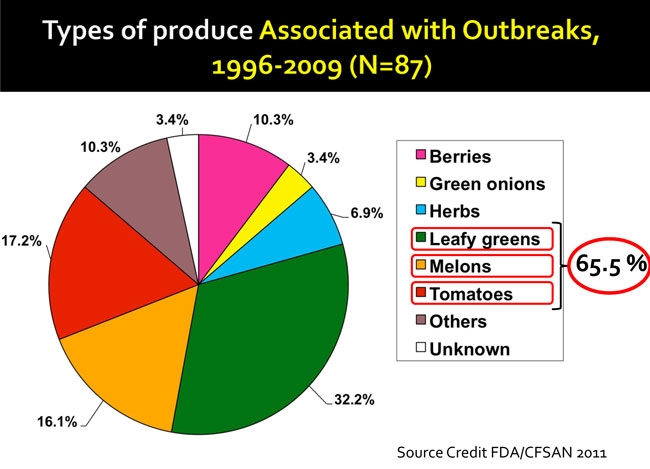For consumers, the effects of food safety practices can seem simple, though critically important: You’re either sick from the food you eat or you’re not.
But for producers, food safety comes in many shades of risk at many critical points in their business operations: water testing, worker hygiene, harvest techniques, postharvest cooling and storage, previous land use, wildlife and more.
To help small-scale farmers better plan for food safety concerns, several UC Cooperative Extension farm advisors are being trained in food safety audits and are planning food safety workshops. The project is led by Shermain Hardesty and Richard Molinar of the Small Farm Program, with funding from the UC Division of Agriculture and Natural Resources.
The group is beginning to offer workshops for farmers in eight regions of California.
Why now?
New FDA regulations are being developed for the Food Safety Modernization Act that will affect food producers, among others. The act includes an exemption for farms whose annual sales were less than $500,000 on average during the last three years, with the majority of their product sold directly to consumers, farmers markets and restaurants within the state or within a 275-mile radius.
"Even though it exempts many small farmers, the Food Safety Modernization Act says the exempt producers would still need to comply with any food safety regulations from state and local governments," Hardesty said.
Trevor Suslow, UC Cooperative Extension specialist in food safety at UC Davis, has said that the FDA can withdraw the exemption with cause.
“Whether or not the exemption will hold, I think, is incumbent on everybody,” he said.
He expects the regulations will be implemented in tiers, with smaller farms having three years to comply once the regulations are final.
Even without regulations in place, more buyers — including packinghouses, retailers and at least one certified organic distributor — are requiring farmers to meet food safety standards. Insurance companies are also, in some instances, cancelling policies or hiking rates for small farmers who have not documented their food safety practices, according to Hardesty.
Many farmers who work with large packinghouses, sell to major distributors or are members of a commodity-specific commission have already established their food safety practices to adhere to standards of their industries.
But smaller farmers who grow multiple crops or who aren't part of a commission may still be looking for food safety guidance, which these workshops aim to provide.
"Most of the growers I work with are exempt, but even so, they are very concerned about how it will affect them," said Cindy Fake, one of the UC Cooperative Extension farm advisors who is part of the project and works in Placer and Nevada counties. "There is a lot of awareness of what is coming down the line."
Food safety basics
The workshops will include presentations about food safety as it relates to regulatory and business trends, previous land use, workers, water, wildlife, waste, soils, harvest, transportation, traceability and farm mapping. What should a farmer do with all this information?
“First and foremost, farmers should have some sort of food safety manual, a written food safety manual for their individual farm,” explained Richard Molinar, UC Cooperative Extension farm advisor in Fresno County. “And then if they want or need to be certified, that’s a second step with a third-party auditor.”

In his session, Suslow examined the link between fresh produce, outbreaks and illnesses. Leafy greens, melons and tomatoes have been associated with a combined 65 percent of produce-related outbreaks, between 1996 and 2009.
He listed key areas of food safety for all farming and shipping:
- Water: pre-harvest and postharvest
- Workers: hygiene and training
- Waste: manure and compost
- Wildlife: intrusion and fecal
- Recordkeeping
- Traceability
Food safety programs, he explained, depend on multiple hurdles to help prevent biological, chemical and physical hazards from entering food, surviving, growing and persisting.
Cold chain management is one critical aspect of postharvest food safety. Bacteria can double in a very short period of time if cold chain management is neglected.
“In just a few hours, you can go from something that won’t affect most of us to something that would make you sick,” Suslow said.
Workshops
Food safety workshops for this project will be held in multiple regions around the state. The first such workshop, scheduled for April 12 in Santa Rosa, has already sold out.
Registration is available for the next food safety workshop, May 3 in Stockton. The workshop is free to attend, though pre-registration is required.
Additional workshops will be planned by UC Cooperative Extension farm advisors participating in the project, who are located in Lake, Sonoma, San Joaquin, Placer, Nevada, Santa Clara, Fresno, Ventura and San Diego counties.
All food safety workshops associated with this project will be included on the Small Farm Program's calendar as well.
Some additional resources, recommended by farm advisors on this project:
- Creating a food safety manual:
- California small farm food safety manual from UC Cooperative Extension
- On Farm Food Safety project is part of Familyfarmed.org and can help farmers create a customized food safety plan. Suslow was a technical advisor to this project, along with a national team of stakeholders and specialists.
- Good Agricultural Practices Food Safety Plan template from Penn State Extension
- Books from UC ANR:
- Small Farm Handbook includes a chapter on postharvest handling and safety of perishable crops
- Organic Vegetable Production Manual includes a chapter on postharvest handling for organic vegetable crops
- Free publications from UC authors (PDFs)
- Postharvest chlorination
- Water Disinfection: A practical approach to calculating dose values for preharvest and postharvest applications
- Postharvest Handling for Organic Crops
Back to the newsletter: Find more Small Farm News articles from our Vol 1. 2012 edition.